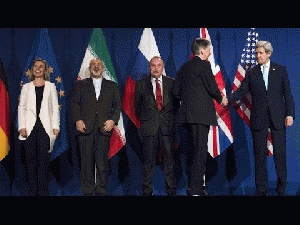Shortly after the participants in the Iranian nuclear talks announced that a double-overtime framework had been crafted, I was on television with Rabbi Shmuley Boteach, who is something of a celebrity rabbi, a failed congressional candidate, and an arch-neoconservative hawk who has been howling about a potential deal with Iran for months. Not surprisingly, he was not pleased by the news of the day. He declared that under these parameters, Iran would give up nothing and would "maintain their entire nuclear apparatus." Elsewhere, a more serious critic, Sen. Tom Cotton (R-Ark.), who last month had organized the letter to Iran's leaders signed by 47 GOP senators opposed to a deal, groused that the framework was "only a list of dangerous US concessions that will put Iran on the path to nuclear weapons."
These criticisms were rhetorical bombs, not statements of fact. Under the framework, Iran would give up two-thirds of its centrifuges used to enrich uranium and would reduce its stockpile of low-enriched uranium (which is the raw material used to develop bomb-quality highly-enriched uranium) from 10,000 kilograms to 300 kilograms. These two developments alone -- and the framework has many other provisions -- would diminish Tehran's ability to produce a nuclear weapon. Its nuclear apparatus would be smaller, and under these guidelines, Iran's pathway to nuclear weapons, while certainly not impossible, would be much more difficult. Yet because politics dominates the debate over this deal -- as it does so often with important policy matters -- foes of the framework could hurl fact-free charges with impunity.






